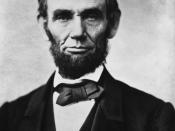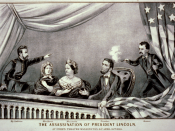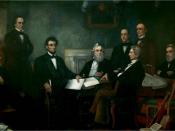Abraham Lincoln is regarded by many historians as the greatest president ever to stand at America's helm. This reputation is extremely well deserved, as Lincoln was able to preserve the Union and gain victory in the civil war, despite his fighting an uphill battle against his own presidential cabinet. Had he not been struggling against this divided government, President Lincoln could have achieved victory with extreme efficiency and a minimum of wanton bloodshed (Angle 659).
After Lincoln was inaugurated on March 4, 1861, he was forced to battle a split cabinet because of campaign promises made to various Republican factions, which made it almost mandatory for certain individuals to be appointed to cabinet posts. He ruled his cabinet with an iron hand, and often acted without cabinet consent or advice. Although his opponents called his method of rule 'dictatorial' and 'unconstitutional,' it was the only effective way to get anything done (Simmons 142).
In the beginning, Lincoln's secretary of state, William H. Seward, clearly considered himself the President's superior, and blandly offered to assume the executive responsibility. He entered the cabinet with the thought of becoming the power behind the
2
Presidential chair and openly opposed Lincoln's control of the Union. This made Lincoln's position as Chief of State exceedingly difficult and hindered his communication and control of the military. As time passed, however, Seward recognized Lincoln's capabilities and gave him complete loyalty (Simmons 174).
This could not be said of Salmon P. Chase, Lincoln's first secretary of the treasury. Blinded by an inflated ego, Chase pursued his own presidential aspirations. He was in constant conflict with Seward, and in general opposition to Lincoln, particularly over the issue of slavery. Chase has been described as 'jealous of the President,' and 'overly ambitious.' Lincoln's personal secretary, John Nicolay, wrote, 'There...


